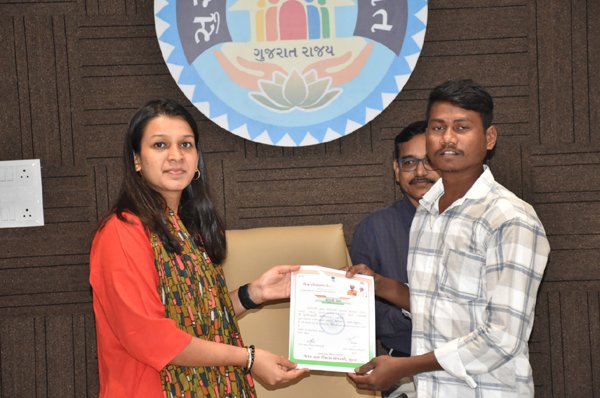Currently, over 50,000 factories in Gujarat are registered under the Factories Act, with approximately 953 categorized as MHAs: Joint Director of Industrial Safety and Health (DISH), Surat Region, Mr. R.A. Patel.
Surat: The Southern Gujarat Chamber of Commerce and Industry organized an interactive session on the topic ‘Industrial Safety, Health, and Compliance’ on Tuesday, December 17, 2024, at 5:30 PM in Seminar Hall-A, Sarsana, Surat. The session was graced by Mr. R.A. Patel, Joint Director of Industrial Safety and Health (DISH), Surat Region, who provided valuable insights to industrialists on industrial safety.
During the welcome speech, Chamber President Mr. Vijay Mevawala emphasized, “Ensuring workplace safety, employee health, and compliance is not merely about policies but forms the foundation of a healthy and progressive workplace. Providing fair compensation, a safe working environment, and care for employee health is the essence of labor laws. It is the organization’s responsibility to adhere to all legal provisions and take positive steps toward employee well-being. We must always remember that safety begins with awareness, health grows with care, and compliance is both a legal and moral duty.”
Mr. R.A. Patel shared that currently, more than 50,000 factories are registered under the Factories Act in Gujarat, of which about 953 fall under the MHA (Major Hazardous Accident) category due to the storage of hazardous chemicals. Registration under the Factories Act is mandatory for establishments employing more than 10 workers or having construction exceeding ₹10 lakhs. For chemical industries, even a single employee requires factory registration. Additionally, he highlighted that factories must get their machinery layout plans approved by the Directorate of Industrial Health.
The session addressed rising cases of fatal accidents in Surat’s industries and underscored the importance of safety measures. Recommended precautions include installing standard elevators, maintaining two emergency exits in factories, equipping workplaces with fire alarms and emergency sirens, placing fire extinguishers every 15 meters, and appointing qualified safety officers for factories with over 100 workers. Employees should also receive fire extinguisher training. Mr. Patel elaborated on various provisions under the Factories Act, 1948.
Mr. Dahyabhai Patel cited examples of past industrial accidents in the city and the country, illustrating how preventive measures could have averted such incidents.
The session was moderated by Mr. Sohil Savani, Chairman of the Chamber’s Labor Law Committee, while Co-Chairman Mr. Anand Mehta outlined the program. The event saw participation from industrialists, HR professionals, and safety officers. Speakers satisfactorily addressed all queries from the attendees. The session concluded with a vote of thanks by committee member Mr. Nehal Choksi.


